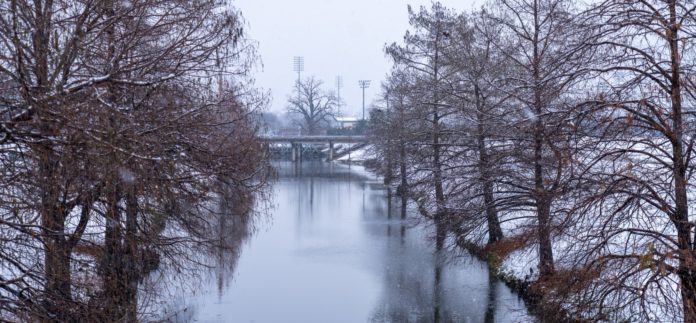
By Shea Berthelot | Intern
Baylor’s campus is closed through the end of day Friday, with the university outlining a number of other safety precautions. Professors have also been advised to prepare for online instruction into next week due to inclement weather.
With much of campus covered in sleet and no signs of stopping, Baylor officials will be making decisions throughout the weekend on how campus will operate over the next few days until the weather clears up.
As per Baylor’s emergency alert email mid-Thursday, COVID-19 testing tents were shut down at 12:30 p.m. on Thursday and will remain closed Friday. Baylor students and faculty with scheduled weekly tests that they were unable to take due to the weather are expected to continue with their tests as normal next week.
The Baylor Visiting Experience canceled the shuttle, bus, and private tours halfway through the day Thursday after being told by campus safety they were unable to conduct tours using vehicles. Despite the cold, walking tours were still conducted.
All Friday tours have been canceled and as for Saturday “the university will decide by Friday at noon whether the tours will need to be canceled for Saturday” said Madeline Ahrens of the Visiting Experience office.
As for the prospective students whose tours were canceled Ahrens said “they will be able to reschedule for a tour.” The Visiting Experience supervisor Meredith Marok also added that a decision will be made at noon on Sunday whether the tours for Monday will continue as scheduled.
According to Baylor meteorology expert Dr. Trey Cade III, these are temperatures this area hasn’t seen in decades.
“The last time in Waco that we got down into the single digits … in February was 1985,” Cade said.”If we get down to the single digits early next week … then that will have been thirty-plus years since that happened.”
He added wind chills could drop below zero, which would result in even more dangerous conditions.
“Although things are bad now, the coldest air hasn’t even gotten here yet,” Cade said.
Staying indoors and making sure to check on the elderly in the event their heat or electricity goes out is incredibly important to save lives according to Cade.
In regards to protecting property, he said to remember the “four Ps” of winter weather: people, pets, pipes and plants, also adding that it is important to make sure there is plenty of food stocked up in the pantry.
As far as taking care of pets, Cade said they need to be kept indoors and to avoid damage to “any external pipes on your house … making sure they have covers on them or they are wrapped … to keep them from bursting.”
“If you have any plants that are outdoors that you can bring indoors, bring them indoors,” Cade said. “If you can’t bring them indoors, then covering them with blankets or sheets.”
He also advised that Waco could potentially face power outages as the weather gets worse.
“Something that can happen when you get build-ups of ice, you can get power outages because that ice can take down power lines, so … be prepared for that situation,” Cade said.
He emphasized the importance of operating fireplaces and space heaters safely if you have them. As for generators, he made sure to operate them outside to avoid death by carbon monoxide poisoning that can result from inside use.
“If you have to get out in your car in these very cold conditions, make sure you keep your fuel tank as full as possible and make sure you take blankets with you … that if you break down on the side of the road, you have blankets, something that can help keep you warm,” Cade said.
Cade said people need to be prepared for “several days where we don’t get above freezing.”
“We have the possibility for some significant snowfall on Monday, so we could get, right now the early forecast is for 3-6 inches of snow Monday morning,” Cade said.
Many Baylor students unaccustomed to the weather may be wondering how to stay safe in an unfamiliar event.
Shorewood, Ill., freshman Stephanie Bertino gave some advice as someone from a state further north on staying safe and warm while outside is anything but.
“This type of weather is pretty common in the winter from November to February or March,” she said about her life back home. “We get a lot of snow and … sleet. It’s pretty common.”
Having to deal with this often, Bertino said to “avoid driving, especially it being icy and below freezing, or at freezing it’s really dangerous.”
“Bundle up because you can get cold very easily especially if it is raining and sleeting, so just be careful walking and stay inside if you can,” Bertino said.





